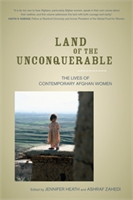
03 May Book: Land of the Unconquerable
Although women’s issues in Afghanistan have been the focus of intense interest over the past decade, the subject is one that has often been marred by over-simplification and cliche. Land of the Unconquerable is a new collection of essays by scholars, humanitarian workers, politicians and journalists that attempts to paint a three-dimensional portrait of the lives of Afghan women and the challenges and opportunities they face. Touching on a diverse range of issues, the book features chapters by several AREU authors.
These include former gender researcher Deborah Smith, who documents Afghan marriage practices; livelihoods experts Jo Grace and Adam Pain, examining women’s place within the agrarian economy; Lauryn Oates (who worked with AREU to examine the 2009Shi’ite personal status law), who explores women’s visual arts and their relationship to the public sphere; and governance researcher Anna Larson, who distils the findings from an AREU report on women’s interests in parliament:
“Central to the debate on affirmative action is the recent shift, in terms of political representation in general, from a “politics of ideas†to a “politics of presence.†Demands for women’s (and other minority groups’) greater political participation have replaced the concept of a representation through ideas, political platforms, and corresponding policy…
However, it is ultimately clear that women’s presence in Afghanistan’s legislature has not led to the collective representation of women in general or the promotion of women’s gender interests to date. A number of factors pose key challenges: attitudes toward the legitimacy of their very presence in parliament, assumptions concerning who they represent therein, and the existence of cross-cutting identities and allegiances that fragment efforts to mobilise as a collective bloc. Underpinning these factors is the essential consideration of decreasing security, which is rendering the concept of free speech essentially meaningless in 2010.. Technical measures to improve the functioning of parliament are necessary and may provide the mechanisms needed to encourage bloc formation and the representation of collective interests. However, until MPs feel secure enough to broach and vote on controversial subjects such as women’s gender interests—with the confidence that their opinions will not generate violent opposition—the chance of these interests being promoted substantively will remain elusive.”
Land of the Unconquerable: The Lives of Contemporary Afghan Women is edited by Jennifer Heath and Ashraf Zahedi, and available from the University of California Press.

